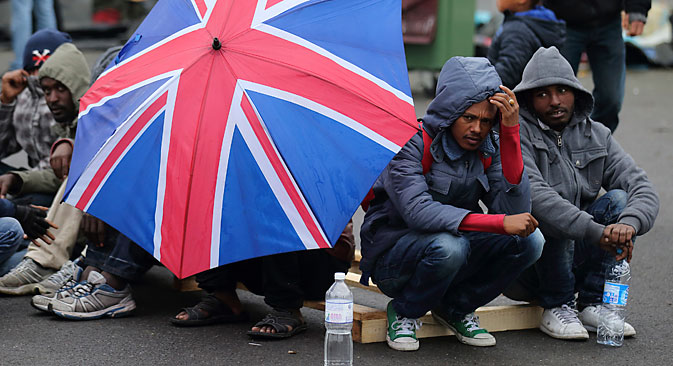
No migrants from the EU in the UK? Source: Reuters
British Prime Minister David Cameron has sparked anger in Brussels with proposals to limit access to the UK for immigrants from the European Union.
European Commission president Jose Manuel Barroso says free movement of people in the EU is an "essential" principal that cannot be changed.
The row has not gone unremarked in the Russian press.
Pravda online picked up on an RT story about comments made by the Tory mayor of London, Boris Johnson.
Although he carefully cultivates the image of a blond mop-headed buffoon, Eton educated (like Mr Cameron) Mr Johnson is no fool. His British newspaper column is often used to fly a flag for potentially controversial policies.
Days before it became known that Mr Cameron intends to announce plans before Christmas to limit EU immigration, Mr Johnson was telling readers that Britons were "enraged" by a migration system that was "out of control," Pravda reported.
Populist and political measure
He made it clear that this was not only a populist measure but also a political response to dangers to the Tory vote posed by UKIP (Britain's new right of centre UK Independence Party, which wants the country leave the EU.)
Limiting EU immigration would help keep voters from "crossing over" to UKIP, which is hard-line on immigration issues. Mr Johnson insisted Tories were not "racist" but wanted to stop the "madness" and regain control over the UK's borders, Pravda said.
Like most Russian media reports about the UK, Pravda's story stuck to the facts with little or no elaboration. If any bias is detectable in Russian coverage it is in the selection of stories rather than any 'spin', which tends to be a British affliction.
Russian readers might be surprised to learn that closing the door on immigration has a long, some might say notorious, history in post-war British politics. Loss of empire was accompanied by a sharp increase in immigration from former colonies, prompting tensions reflected in Tory politician Enoch Powell's infamous 1968 "rivers of blood" speech warning of dire consequences of rapidly changing Britain's racial mix.
The Tory party has struggled ever since to shake off a reputation as "the nasty party" although such nuances of British political life are rarely reflected in the Russian press.
Multi-million rouble visa
Of more interest to Russian readers are issues that may directly affect them, although RIA Novosti's report about the doubling of the amount of money investors need for special business visas, and with them the chance to eventually settle in Britain, will only be of relevance to a few readers.
The state news agency reports that from early November, requirements for "investment visas" are being doubled from £1 million to £2 million.
As the rouble continues its precipitous plunge against major world currencies, that means that Russians wanting to set up shop in the UK and become eligible for the next steps, applying for residence and a British passport, will need to fork out a stupendous 130 million roubles.
RIA remained impassively objective in its coverage, betraying not a hint of the dismay the news may elicit in those Russians looking for a full-time ticket to London.
"[British] immigration rules are now changed regularly," it noted, reminding readers and quoting British "deputy interior minister", James Brokenshire, security and immigration minister at the Home Office, that this is designed to help "combat violations and strengthen the status of the UK as a great place to do business."
The multi-million rouble investment will earn a businessman and his dependents a visa good for 3 years, four months, which can be extended for a further two years, the agency reported.
But with Russia said to be mulling the introduction of restrictions on the ability of its citizens to leave the country, including Soviet-era exit visas, there could well be some takers for the expensive British visa.
Chinese whispers
There are, however, some tourists the UK wants to attract and one in particular the national seems keen to hang onto, come what may, as travel website slavi.ru noticed.
Signage at a range of top British tourist destinations, reported to include Stonehenge, Big Ben and Buckingham Palace, are to be translated into Chinese to help lure more Asian tourists, the website says.
It will prove 'Double Dutch' for most of us, but even for an English-speaking tourist Britain can be a confusing place, as American David Willis discovered last week just a stone's throw from London's Chinatown when he found himself trapped in the Trafalgar Square branch of British bookstore Waterstones.
Mr Willis, who hails from Texas, was browsing on the upper floor of the Russian-owned shop (millionaire Alexander Mamut's company A&NN Capital Fund Management bought it in May 2011) one evening and failed to notice, or be notified by staff, that it was closing, slavi.ru reported.
When he came downstairs he found the shop was locked and shuttered for the night. Unruffled by the experience of involuntary imprisonment, Mr Willis used his mobile phone not to call the police, but to take to Twitter to alert the world to his predicament.
The opinion of the writer may not necessarily reflect the position of RBTH.
All rights reserved by Rossiyskaya Gazeta.
Subscribe
to our newsletter!
Get the week's best stories straight to your inbox